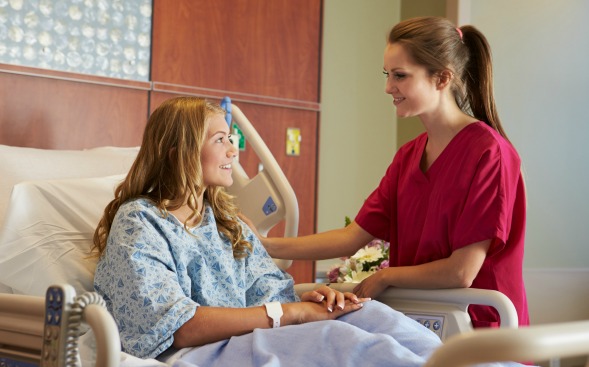10 Medical Myths Your Patients Believe

By Jennifer Larson, contributor
Medical myths. Old wives’ tales. Falsehoods. Half-truths.
You’ve probably heard a million of them during your nursing career--especially if you’ve had the opportunity to meet patients across the country as a traveling nurse.
Rather than sighing or shrugging them off as nonsense, consider that health-related myths are a great opening for some patient education. While every nurse may have a slightly different nursing philosophy, the responsibility to educate patients about their health is likely central to your core beliefs.
“It’s really patient-centered care to find out where they’re getting their information and help steer them toward good information,” said Kathy Mertens, MN, MPH, RN, president-elect of American Academy of Ambulatory Care Nursing.
RELATED: Three Ways to Be a Better Nurse
The top 10 medical myths your patients are falling for:
Here’s a list of 10 common medical myths or misconceptions that staff and travel nurses can help clear up with a well-administered dose of patient education:
1. You can get the flu from a flu shot.
People reluctant to roll up their sleeves for a flu vaccine often confide that this is their fear. Fortunately, as Mertens noted, you can reassure your patients that the influenza vaccine is made from an inactivated virus that won’t give them the flu.
You might caution patients that they can best protect themselves by washing their hands frequently and trying to avoid being around anyone who has the flu, in addition to getting a flu shot.
2. You’ll get arthritis from cracking your knuckles.
Nope. A person can irritate their joints and make them sore by repeatedly cracking his or her knuckles, but there is no evidence that it causes arthritis.
A patient who already has osteoarthritis might notice worsening symptoms--but why someone with sore knuckles would want to crack them is beyond us. Rheumatoid arthritis, caused by an autoimmune response, has no relation whatsoever.
3. Drinking cranberry juice will clear up a UTI.
Cranberry juice may reduce the likelihood that you’ll get a urinary tract infection (UTI), but guzzling down a bunch of the ruby-colored juice will not clear up an existing UTI by itself. Some people have found that the juice can reduce the pain and discomfort of a UTI, but a course of antibiotics will probably still be necessary.
4. An antibiotic will knock out that pesky upper respiratory bug.
Only if it’s a bacterial infection. Antibiotics do not cure viral infections, including colds and influenza. In fact, the incorrect use of antibiotics has led to a sobering increase in antibiotic resistance. Nurses may want to incorporate some standard information about appropriate antibiotic use into their nurse teachings.
5. Deodorant can cause breast cancer.
Let your patients know that it’s okay to use these products if desired. The National Cancer Institute reports that there is no scientific evidence linking increased rates of breast cancer to the use of deodorant or antiperspirant.
6. Brand name medicines are better than generics.
Nurses can reassure patients that generics are formulated the same as the brand-name drugs and are perfectly safe to use--as long as they are obtained through a licensed pharmacy and approved by the FDA. The big difference is price, as generics are far cheaper.
Patients can find out if there is an approved generic equivalent for a brand-name drug by using Drugs@FDA.
7. You can’t get pregnant while you’re breastfeeding.
There are dozens of myths and half-truths floating around about when a woman can or can’t get pregnant. The truth is that it is possible for a woman to conceive while breastfeeding, which is why experts recommend thinking about the most appropriate contraceptive method to use during lactation.
8. Vaccines cause autism.
Despite celebrities’ claims to the contrary, research shows that there is no link between childhood vaccinations and autism. Check out the Centers for Disease Control and Prevention (CDC) autism/vaccine information page.
Another great resource for nurses and patients is this blog post by Peter Hotez, president of the Sabin Vaccine Institute and father of an autistic child. He includes research papers debunking the myth, and explains why some studies cited by proponents do not provide valid evidence of a link.
9. You need to detox.
The internet, TV and other media are filled with passionate recommendations for detoxification products or regimes. But actually, you already possess perfectly fine things that help your body detox itself—your liver and kidneys. And while some detox products won’t do much of anything, some may actually be harmful.
Find more patient education resources about detoxes and cleanses from the National Institutes of Health.
10. Sugar makes kids hyperactive.
There are some good reasons to limit the amount of sugar that a child ingests on a regular basis, but avoiding hyperactivity is not one of them. Researchers have not found any hard evidence of a correlation.
Some studies, however, have shown that high amounts of sugar can affect attention span or adrenaline production, which may affect behavior and mimic some aspects of hyperactivity.
When you encounter these kinds of medical myths and misinformation from a patient, remember to be respectful of them. They are trying to take care of themselves, and they may just need some guidance to access trusted information and understand your nurse teachings.
“You might have to reframe how you approach things with their cultural perspective in mind,” said Mertens, adding that it may be helpful to pull in a cultural mediator or community partner in certain situations.
SHARE YOUR nursing knowledge in a new location with exciting travel nursing jobs!